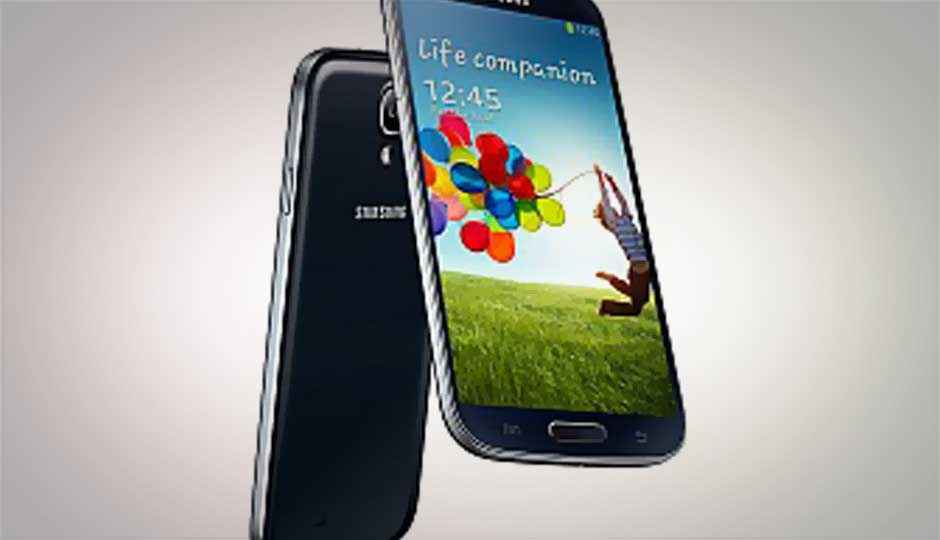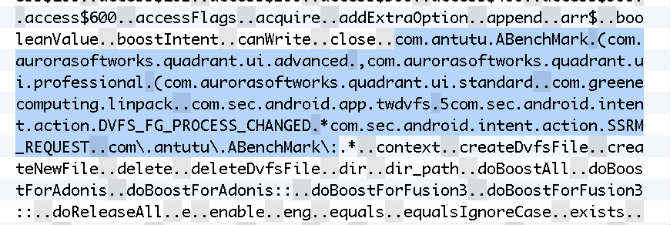Samsung denies claims that it doctored Galaxy S4 benchmark results

Samsung's official statement still ignores certain findings, including the existence of the 'BenchmarkBooster' string in the Galaxy S4's system files.
Samsung has released a statement refuting all accusations that it engineered the Galaxy S4’s hardware to perform better when running certain benchmarks. In the statement posted on its blog, Samsung says, “The maximum GPU frequencies for the Galaxy S4 have been varied to provide optimal user experience for our customers, and were not intended to improve certain benchmark results.” Samsung’s statement comes in the wake of yesterday’s news that the Galaxy S4’s CPU and GPU were clocking at higher than normal speeds when running recognized benchmarks. According to a Galaxy S4 user on the Beyond 3D forums and AnandTech, the Galaxy S4’s GPU is clocked at a default speed of 480MHz when running regular apps but speeds up to 532MHz when running certain popular benchmarks.
Samsung’s blog post states that the GPU inside the Galaxy S4’s Exynos 5 Octa SOC had a theoretical maximum clock speed of 533MHz but that was brought down to 480MHz for certain gaming apps “that may cause an overload, when they are used for a prolonged period of time in full-screen mode.” The post further goes on to say that the Galaxy S4 does allow the GPU to work at its maximum clock speed when “running apps that are usually used in full-screen mode, such as the S Browser, Gallery, Camera, Video Player, and certain benchmarking apps, which also demand substantial performance.” In an update, AnandTech has revealed that almost none of the Galaxy S4’s first party apps mentioned in the statement actually push the GPU to 532MHz and the behaviour seems to be limited to the popular benchmarks. They added that the camera is the only first party app that pushes the GPU to the maximum clock speed but that speed is not sustained. In contrast, running popular benchmarks on the Galaxy S4 seems to elicit the higher clock speeds for a longer duration.
Apart from the above inconsistency, Samsung’s clarifications have still left other questions unanswered. Samsung seems to have strangely left out commenting on certain things that were uncovered by AnandTech. For instance, AnandTech found that the Galaxy S4’s Exynos 5 CPU also runs at maximum clock speeds when running certain benchmarks, irrespective of the load put by the benchmark and that when a regular app (or a non-recognised benchmark) is run, the clock speeds get lower, even if the app (such as GFXBench 2.7.0.) is similar to the recognised benchmarks that “demand substantial performance.”
Samsung has also entirely ignored the existence of the ‘BenchmarkBooster’ string that AnandTech found in one of the Galaxy S4’s system files. The ‘BenchmarkBooster’ string makes for interesting reading since it actually refers to benchmarks by name that have been given permissions to boost the GPU clock speeds to the maximum.
An extract from the ‘BenchmarkBooster’ string.
However, like we stated in yesterday’s story on the same issue, this behaviour by the Galaxy S4 doesn’t affect you, the user, in a major manner. Samsung’s decision to set the actual GPU clock speed lower than the theoretical maximum is standard practice because otherwise you run the risk of your device overheating and even failing. However, the problem lies in the fact that Samsung set certain rules for the Galaxy S4’s operation and then deliberately let certain benchmarks break those rules just so that they could post higher numbers. This is disingenuous as it does not let benchmarks paint an accurate picture of the Galaxy S4’s performance and it also does not let potential buyers compare the S4 with other competing devices accurately with the help of benchmarks.
If you are in the market for a new smartphone, our advice, as always, would be to rely on real-world use and your comfort with the device rather than synthetic benchmark figures. Even if you do tend to refer to benchmarks, don’t let those numbers be a big factor in helping you decide on a smartphone.
Do you think Samsung was wrong or are we all fussing about nothing? Let me know on Twitter @postwar or in the comments section below.

